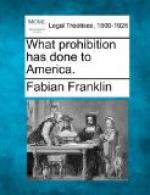CHAPTER III
Destroyingour federal system
Thus far I have been dealing with the wrong which the Prohibition Amendment commits against the vital principle of any national Constitution, the principle which alone justifies the idea of a Constitution—a body of organic law removed from the operation of the ordinary processes of popular rule and representative government. But reference was made at the outset to a wrong of a more special, yet equally profound, character. The distinctive feature of our system of government is that it combines a high degree of power and independence in the several States with a high degree of power and authority in the national government. Time was when the dispute naturally arising in such a Federal Union, concerning the line of division between these two kinds of power, turned on an abstract or legalistic question of State sovereignty. That abstract question was decided, once for all, by the arbitrament of arms in our great Civil War. But the decision, while it strengthened the foundations of the Federal Union, left unimpaired the individuality, the vitality, the self-dependence of the States in all the ordinary affairs of life. It continued to be true, after the war as before, that each State had its own local pride, developed its own special institutions, regulated the conduct of life within its boundaries according to its own views of what was conducive to the order, the well-being, the contentment, the progress, of its own people. It has been the belief of practically all intelligent observers of our national life that this individuality and self-dependence of the States has been a cardinal element in the promotion of our national welfare and in the preservation of our national character. In a country of such vast extent and natural variety, a country developing with unparalleled rapidity and confronted with constantly changing conditions, who can say how great would have been the loss to local initiative and civic spirit, how grave the impairment of national concord and good will, if all the serious concerns of the American people had been settled for them by a central government at Washington ? In that admirable little book, “Politics for Young Americans,” Charles Nordhoff fifty years ago expounded in simple language the principles underlying our system of government. Coming to the subject of “Decentralization,” he said:




